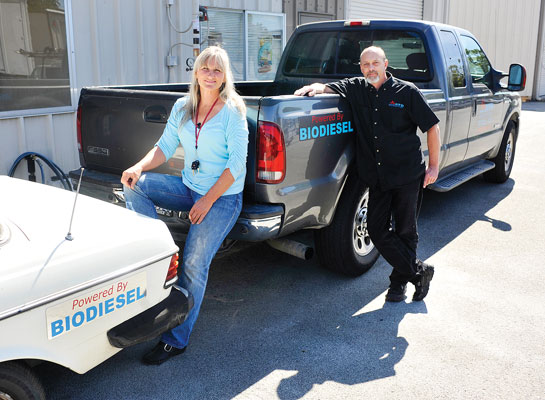Used French-fry grease hasn’t been around as long as petroleum,
but Morgan Hill resident Cindy Gobin knows it can power a vehicle
just as effectively.
Used French-fry grease hasn’t been around as long as petroleum, but Morgan Hill resident Cindy Gobin knows it can power a vehicle just as effectively.
Gobin, 59, operates her two diesel-engine vehicles – a 1982 Mercedes-Benz and a Ford F350 pickup – on biodiesel made from used vegetable oil. The renewable fuel costs slightly less than petroleum diesel when end-of-the-year tax credits are factored in, but Gobin uses the cleaner fuel more out of her commitment to the environment and her six children’s future.
“We’re destroying the environment by using fossil fuels,” Gobin said. “We should be using solar, wind – there are so many choices. We should be working on renewable energy, not sequestered carbon.”
A Morgan Hill resident for 25 years, Gobin has long believed in sustainable living practices such as keeping energy consumption light, growing her own fruits and vegetables and eating locally produced food.
In an attempt to cut down on her vehicle emissions, Gobin purchased a Toyota Prius in 2002, the first year the hybrid car was produced. But while that car is more fuel-efficient than a standard gas-powered vehicle, Gobin was still uneasy about the fact that she was still using some fossil fuels while there were even cleaner options on the market.
“I’m getting more and more into alternative fuel, mostly out of a desire to be green and save some money,” Gobin said from her west Morgan Hill home last week.
In 2006 Gobin purchased her Ford diesel pickup. She didn’t have to make any modifications to the engine or fuel system to run biodiesel, which she still purchases from the Green Station in Santa Cruz.
Some extra maintenance is required for some older vehicles to use biodiesel – such as more frequent replacement of fuel filters and rubber fuel lines – but at only a minor expense of time and money, Gobin explained.
Gobin puts in a lot of miles for her job as co-owner, with her husband, Dale, of ATD Architectural Products in Gilroy. Some days she drives up to 200 miles delivering stainless steel products around the Bay Area, and her biodiesel-powered Ford has been a clean and reliable delivery truck.
“That’s a lot of air pollution with petroleum,” Cindy Gobin said.
Last year, amid the highly-publicized BP oil spill in the Gulf of Mexico, Gobin decided to purchase a second biodiesel-powered vehicle for personal use, and went with a Mercedes-Benz she found on Craigslist for only $1,500.
Now the Green Station’s truck driver delivers biodiesel to Gobin’s shop in Gilroy, where she has a 375-gallon storage tank that supplies both her vehicles. A perennial advocate, Gobin displays large stickers on the doors of each vehicle, indicating the cars are powered by biodiesel.
Biodiesel is still cheaper than petroleum diesel with a $1-per-gallon federal tax credit for consumers, but users have to wait until the end of the year to realize that savings, Gobin said. Last week, Gobin’s price at the pump for biodiesel was $4.09, while the cheapest gallon of petroleum diesel in Morgan Hill was about $4.04.
Gobin doesn’t know her exact fuel efficiency with biodiesel, but she figures both her vehicles get at least as many miles per gallon as they would on petroleum diesel.
Due to the fact that biodiesel is made from renewable resources such as plants, it doesn’t add as much burned carbon back into the environment as fossil fuels which have been in the earth for millions of years, Gobin explained.
“What I use is grease, which has already had a life – making food,” Gobin said. “You don’t pollute the atmosphere, plus you’re recycling a product that would have been waste. That makes it better than carbon-neutral.”
The Green Station’s fuel is made out of “100 percent recycled vegetable oil – restaurant grease,” co-owner Ray Newkirk said.
The Green Station, based in Santa Cruz, has about 700 regular customers in the “greater Santa Cruz area” – which includes Morgan Hill and Gilroy. Gobin is their only client in southern Santa Clara County so far, but the biodiesel distributor also has a small station in Campbell which serves about 100 regular customers.
Biodiesel is growing in popularity and its economic impact not only locally but nationwide. In 2011, the biodiesel industry will support more than 31,000 jobs, generate nearly $1.7 billion in income and create more than $3 billion in GDP, according to the National Biodiesel Board, the industry’s trade group.
In fact, when the U.S. Congress briefly allowed the tax credit to expire, it sent shockwaves through the industry which quickly shed about 8,900 jobs nationwide, the NBB said in a recent study. Still, biodiesel advocates note that the industry is not nearly as dependent on such subsidies and financial assistance as oil is.
The advantages of biodiesel are numerous, and even bigger than the financial impact, to Newkirk.
“The biggest thing in my book is it’s a renewable fuel,” Newkirk said. “We can grow it or recycle it. The emissions are far cleaner than petroleum diesel. We don’t have to ship it around the world and support countries who support terrorists. It’s better for the engine – it’s a better lubricant. It’s supporting local economies. This is a truly American-made fuel.”
And for Gobin – who happens to be an active member of the community as vice president of the Morgan Hill Community Garden, juror of the Poppy Jasper Film Festival and an AAUW member – it’s just part of her desire to look out for her children and grandchildren.
“In the long run, it’s better for the environment. I’d like to try to take care of future generations (now),” Gobin said.








